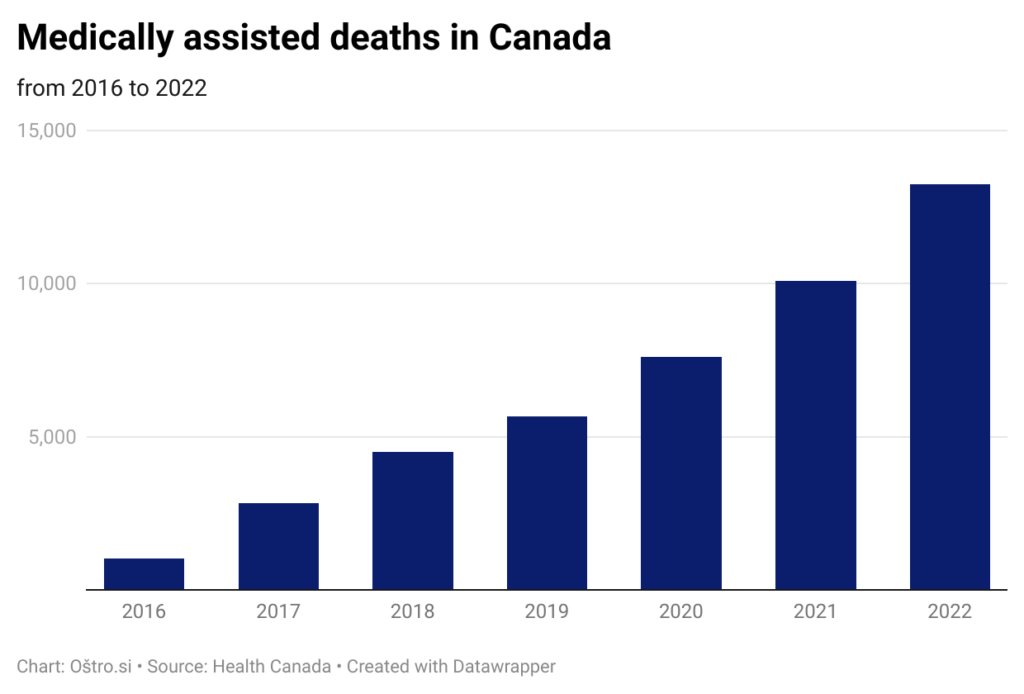Original article (in Slovenian) was published on 21/3/2024; Author: Lara Mavrič
Although Canada revised its laws in 2016 to allow medical assistance in dying, individuals with mental illnesses remain ineligible.
On 7 March, Alenka Jeraj, a deputy of the Slovenian Democratic Party (SDS), stated during a session of the Slovenian National Assembly that Canada legalized euthanasia for the elderly with terminal illnesses in 2016. She further claimed that in 2021, eligibility expanded to include patients with mental illness and those with end-stage illnesses and terminal medical conditions.
In 2016, the Canadian Parliament passed amendments to four laws, enabling individuals of legal age with serious and terminal health conditions to seek medical assistance in dying. The amendments were designed to protect doctors and nurses from criminal prosecution for assisting in a death.
Since then, persons who are no longer able to live independently because of a serious and terminal health problem, have no other appropriate treatment for their condition, or whose death is foreseeable because of a health problem, have been eligible for medical assistance in dying.
Before applying for medical assistance in dying, applicants must be informed of other procedures that could alleviate their suffering, such as palliative care.
When mental illness is the sole underlying condition, patients are not eligible for medical assistance in dying because their natural death is not foreseeable. However, the Canadian parliament commissioned independent studies to examine advance requests for assistance, as well as requests made by mature minors and by patients with mental illness.
In 2021, the Canadian parliament passed an amendment to the Criminal Code allowing those whose natural death is not reasonably foreseeable to request medical assistance in dying.
The 2021 amendment stipulates that patients with mental illness will not be eligible for medical assistance in dying until at least 2023. This transitional period was extended by subsequent amendments to the law, first to 2024 and then, in February this year, to 2027.
Jeraj also claimed that more than 60,000 people have been euthanized in Canada in seven years, of which 13,241 in 2022 alone.
According to the annual report for 2023 by Canada Health, the country’s health ministry, 44,958 assisted deaths were recorded between 2016 and 2022. The highest number, just over 13,000, was recorded in 2022.

On 7 March, Slovenian MPs debated a bill on assistance in voluntary dying, which was tabled in July 2023 by the Srebrna Nit, an association fighting for a dignified old age. The bill was rejected at first reading and will not be discussed further.
On the same day, coalition deputies submitted a motion to the National Assembly to call a consultative referendum on the right to assistance in voluntary dying.
Razkrinkavanje has shared these findings with Jeraj. The response will be published upon receipt.
Jeraj’s claim that medical assistance in dying in Canada was originally intended for the elderly with terminal illnesses is not true.
Her claim that Canada has extended medical assistance in dying to patients with mental illness, end-stage patients and terminally ill patients in 2021 is not true.
Jeraj also claimed that more than 60,000 people have been euthanised in Canada in seven years, but, according to official figures from Health Canada, there have been just under 45,000 medically assisted deaths in that period. A total of 13,241 happened in 2022, which means that this part of her claim is true.
The part of the claim that there were 60,000 medically assisted deaths in Canada over seven years is not true.



